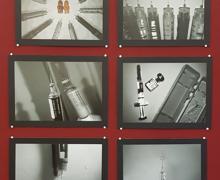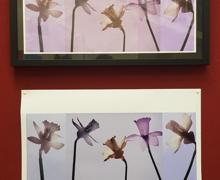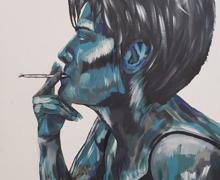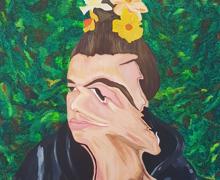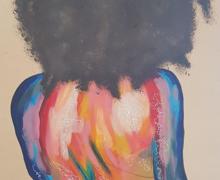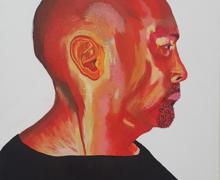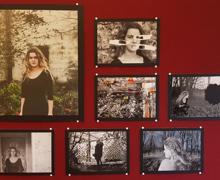- Home
- Sixth Form
- Curriculum
- Art & Photography
Art & Photography
Introduction
For students with more definite ambitions towards exploring and developing a career path in the more creative industries, we offer both Art and Photography at A Level within our Sixth Form. These courses have been designed to provide the very best of platforms from which Foundation or Degree level study can be confidently embarked upon.
For either discipline, students will be expected to work in a motivated, self-directed manner, at the same time making use of Tabor’s excellently equipped studio and dark room spaces. Teachers will support and facilitate at the start of each project, then direct and steer during each stage, ensuring the best possible responses and outcomes are attained by each member of the course.
Entry requirements are rigorous and prospective students will be expected to have a high level of creativity, observational and organisational skills, and personal resolve.
Aims
- To develop intellectual, imaginative, creative and intuitive capabilities.
- To develop investigative, analytical, experimental, practical, technical and expressive skills, aesthetic understanding and critical judgement.
- To develop independence of mind in developing, refining and communicating their own ideas, their own intentions and their own personal outcomes.
- To develop an interest in, enthusiasm for and enjoyment of art, craft and design.
- To enable the experience of working with a broad range of media.
- To develop an understanding of the interrelationships between art, craft and design processes and an awareness of the contexts in which they operate.
- To develop knowledge and experience of real-world contexts and, where appropriate, links to the creative industries.
- To develop the knowledge and understanding of art, craft, design and media and technologies in contemporary and past societies and cultures.
- To develop an awareness of different roles, functions, audiences and consumers of art, craft and design.
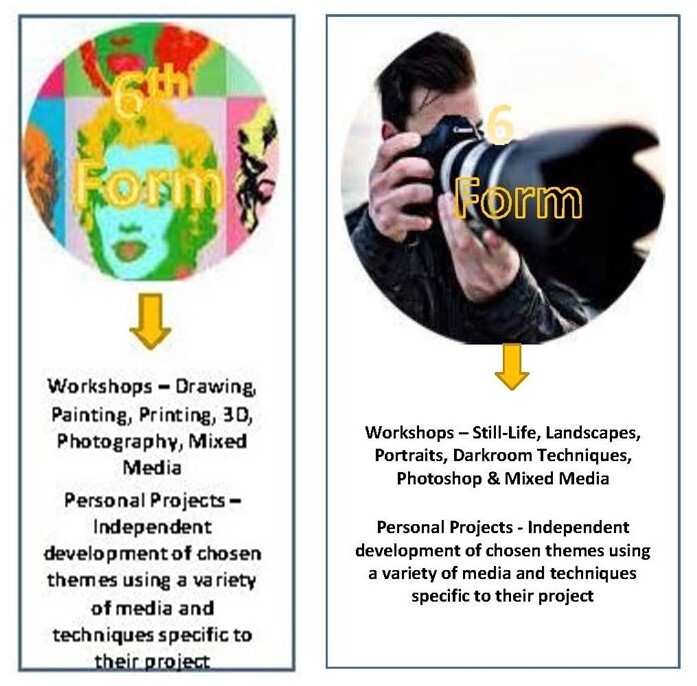
Overview of Curriculum
At Key Stage 5 students currently follow the AQA exam board specification in their study of A Level Art or Photography.
Students experience Art or Photography for 5 hours per week and we regularly assess throughout each project, providing feedback and one to one tutorials to facilitate further development and progress. Students will be expected to undertake regular independent learning at home and Year 13 will feature a mock examination.
Visits to galleries and museums are an essential part of the course.
How is A Level Art and Photography assessed/examined?
Coursework (Component 1 Personal investigation)
This is a practical investigation supported by written material. Students are required to conduct a practical investigation, into an idea, issue, concept or theme, supported by written material. The investigation should be a coherent, in-depth study that demonstrates their ability to construct and develop a sustained line of reasoning from an initial starting point to a final realisation.
The Personal Investigation includes a supporting essay of 1000-3000 words which must link to the individual study subject matter. It must be a critical essay with contextual links and must use appropriate specialist vocabulary. It should be typed with accurate use of spelling, punctuation and grammar so that the meaning is clear, and include a bibliography.
Exam (Component 2 Externally set assignment)
The examination period begins in February of year 13 where students will select 1 of 8 questions provided by the exam board.
Students will have 8 weeks to produce a project of preparatory work, followed by 15 hours of unaided, supervised time. In the exam students will produce a finished outcome or a series of related finished outcomes, informed by their preparatory work.
In both coursework and exam components, work will be assessed against four assessment objectives as follows:
Assessment Objective 1: Develop ideas through sustained and focused investigations informed by contextual and other sources, demonstrating analytical and critical understanding.
Assessment Objective 2: Explore and select appropriate resources, media, materials, techniques and processes, reviewing and refining ideas as work develops.
Assessment Objective 3: Record ideas, observations and insights relevant to intentions, reflecting critically on work and progress.
Assessment Objective 4: Present a personal and meaningful response that realises intentions and, where appropriate, makes connections between visual and other elements.
Students’ work will be internally assessed by teachers in the Art department. A sample will then be selected by the exam board which will be assessed by an external moderator.
A Level Art
In Art we start year 12 with a series of workshops covering a wide range of disciplines, which allow for creative experimentation with varied techniques and processes. The workshops can be completed in or out of a sketchbook and are a way to explore media, developing confidence and initial ideas before embarking on their Personal Investigation.
Coursework is divided in to 4 projects.
Project 1: Drawing, painting, and printing based workshops (9 weeks).
Project 2: Sculpture, photography, and mixed media based workshops (9 weeks).
Project 3: Personal Investigation: Individual project where you choose your own title and investigate, explore, record, and present your own creative and original responses (1 year).
Project 4/Essay: 1000-3000 words to support your Personal Investigation.
Examination: Choice of 8 titles provided by the exam board in February of year 13. Exam prep followed by 15 hours of supervised work.
A Level Photography
In Photography we start year 12 with a series of workshops covering a wide range of disciplines, which allow for creative experimentation with varied techniques and processes. Technical aspects of Photography will be included, such as rules of composition, aperture, shutter speed, and lighting. The workshops can be completed in or out of a sketchbook and are a way to explore subject matter, developing confidence and initial ideas before embarking on their Personal Investigation.
Coursework is divided in to 4 projects.
Project 1: Still-life, landscape, and portraiture based workshops (9 weeks).
Project 2: Darkroom techniques, Photoshop and mixed media based workshops (9 weeks).
Project 3: Personal Investigation: Individual project where you choose your own title and investigate, explore, record, and present your own creative and original responses (1 year).
Project 4/Essay: 1000-3000 words to support your Personal Investigation.
Examination: Choice of 8 titles provided by the exam board in February of year 13. Exam prep followed by 15 hours of supervised work.
Support for learning
Suggested Reading
Art
- This Is Modern Art – Matthew Collings
- A World History of Art – Honour and Fleming
- Ways of Seeing – John Berger
- Art Now 4 – Hans Werner Holzwarth (Editor)
- Story of Art – E.H Gombrich - Phaidon
- The Shock of the New: Art and the Century of Change – Robert Hughes
- The 20th Century Art book – Phaidon Press Ltd
- The Art Book – Phaidon
Photography
- Image Makers, Image Takers – Anne Celine Jaeger
- The Photography Book – Ian Jeffery
- Art Photography Now – Susan Bright
- Photography: A Cultural History – Mary Ellen Marien
- The Photograph as Contemporary Art – Charlotte Cotton
- The Nature of Photographs – Stephen Shore
- Photography – Stephen Bull
- Education of a Photographer – Edited by Charles H. Traub / Stephen Heller
- Photography: The Definitive Visual History – Tom Ang
- Masters of Photography – Reuel Golden
- 20th Century Photography – Reuel Golden
Students should try to read as much as possible to support their studies, collecting articles and images that offer particular interest, inspiration or relevance. There are also many different specialist art, creative, and lens based magazines available both in print and online, which could be subscribed to.
Websites:
- www.artchive.co
- www.artguide.org
- www.artnet.com
- www.artsmia.org
- www.british-museum.ac.uk
- www.craftscouncil.org.uk
- www.designmuseum.org.uk
- www.guggenheim.org
- www.iconeye.com
- www.ikon-gallery.org
- www.metmuseum.org
- www.moma.org
- www.nationalgallery.org.uk
- www.nationaltrust.org.uk
- www.newbritishartists.co.uk
- www.photonet.org.uk
- www.pinterest.co.uk
- www.royalacademy.org.uk
- www.saatchigallery.com
- www.saatchiart.com
- www.sciencemuseum.org.uk
- www.sfmoma.org
- www.somersethouse.org.uk
- www.tate.org.uk
- www.theaoi.com
- www.thelowry.com
- www.vam.ac.uk
- www.walkerart.org
- www.whitecube.com
- www.ysp.org.uk
Career Links
An A Level in Art or Photography is very useful if you wish to work or study in areas relating to:
- 3D product design
- Animation
- App/Game Design
- Architecture – Engineer – Town planner
- Art Restoration – Art Historian – Auctioneer
- Art Therapy
- Cartoonist / Caricaturist
- Fashion Design & Textile industry
- Film / Video making – Photography
- Fine Art – Painting – Sculpture
- Freelance Artist
- Graphic Design – Magazine Editors – Advertisers
- Illustrator
- Interior design
- Jewellery design
- Media – Research, Reporting, Presenting
- Mural Artist
- Occupational Therapy
- Printmaking
- Tattoo Artist
- Teaching – Primary, Secondary, Further Education or Higher Education
- Theatre Design
- Web Page Design.
There are many different types of Photography, and industries where Photography is important, including:
- Aerial
- Advertising – Products
- Architecture
- Portraits
- Fashion
- Freelance Photography – Fine Art
- Journalism
- Magazines
- Music
- Pets
- Publishing
- Scientific
- Sport
- Television
- Travel
- Weddings and Events
A level Results' 2024
Congratulations to the Year 13 students on achieving:
- Art & Design
Grades A*-C 66.67%
- Photography
Grades A*-C 50.00%
A level Results' 2023
Congratulations to the Year 13 students on achieving:
57% Grades A*-D

